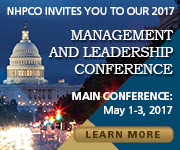A Desire to Learn about and Interact with Different Cultures
There are populations who do not benefit from equitable access to quality end‐of‐life care because of a history of healthcare disparities. Culturosity: Competence inTransitioning End‐of‐Life Care for Underserved Populations from Disparity toEquity is a special preconference seminar addressing this topic that is being offered on Sunday, April 30, 2017, the day before the 2017 Management and Leadership Conference officially begins.
This daylong workshop will provide
participants the opportunity to work through the cultural and systemic issues,
and the inherent biases that exist for underserved and LGBT communities and
communities of color. Using small group sessions, role play and other
cutting‐edge interactive techniques, participants will acquire the knowledge
and skills to help themselves and their programs develop care that brings
equity out of disparity.
A look at NHPCO’s current edition of “Facts and Figures: Hospice Care in America” provides a snapshot of patient race and ethnicity of hospice patients for 2014. While the African American population accounts for over 12% of the overall U.S. population, only 7.6% of those entering hospice programs across the country were African American – and it should be noted that this percentage has dropped in recent years. Those of Hispanic or Latino origin account for 7% of hospice patients and Asians or other Pacific Islanders account for 3% (this represents a slight increase in reaching these populations); multiracial individuals account for 13%.
The provider community has made strides to increase under-utilization of hospice and palliative care by minority communities but much remains to be done as the minority populations in the U.S. are projected to increase in the years ahead.
This seminar, Culturosity, will help providers understand many of the issues involved in disparities and access. Online registration for the Management and Leadership Conference and the preconference seminars is open through March 27, 2017. Register today!








